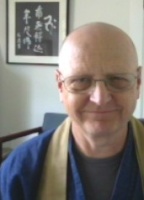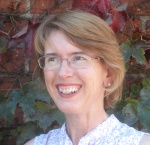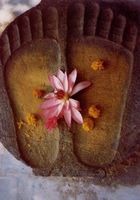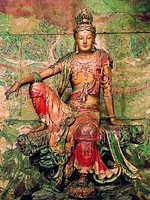 | OBC Connect
A site for those with an interest in the Order of Buddhist Contemplatives, past or present, and related subjects.
|
|
| | Monk VS Lay |  |
|
+6sandokai Sophia Kozan Kyogen Carol Diana 10 posters | | Author | Message |
|---|
Diana
Posts : 207
Join date : 2010-06-11
Location : New Mexico
 |  Subject: Monk VS Lay Subject: Monk VS Lay  8/5/2010, 11:32 am 8/5/2010, 11:32 am | |
| Do you feel discriminated against? Taken advantage of? Underappreciated? Oppressed?
Do monks "train" better than lay people?
How do monks really feel about lay people?
Have you been pressured to join the monk club?
Does the life of a "householder" lead to endless suffering in samsara?
How do we bridge these gaps and form healthy relationships in the sangha?
Can we heal the damage that has been done in the past and turn things around?
What do you think? | |
|   | | Carol

Posts : 364
Join date : 2009-11-10
 |  Subject: Re: Monk VS Lay Subject: Re: Monk VS Lay  8/5/2010, 11:15 pm 8/5/2010, 11:15 pm | |
| I am interested in the response of the monks (past and present) to Diana's questions. I once heard a very senior monk say that monks didn't like to be around lay people because we had "sticky karma." | |
|   | | Kyogen

Posts : 141
Join date : 2010-07-23
Location : Portland, OR
 |  Subject: Re: Monk VS Lay Subject: Re: Monk VS Lay  8/5/2010, 11:55 pm 8/5/2010, 11:55 pm | |
| Hi Diana and Violet, Well, since Violet wants a response from an ordained person, I will respond to: - Quote :
- Do you feel discriminated against? Taken advantage of? Underappreciated? Oppressed?
I used to. I can still feel that way if I let myself, and I'm the abbot. With regard to the other questions: My path into ordination happened very early, and I wasn't pressured, really. But there was aways pressure of one sort or another after ordination. I have given transmission to four lay people and one monk. There's more to that story, and it's a little complicated, but Jiko, who has posted here, is a lay teacher with two students of her own. When I don't accept that things are just as they are, I'm in Samsara. When I both accept that things are as they are, and I respond authentically to them, well, that's something else. Between us Gyokuko and I have sixty formal disciples. Only five of those are monks. I think there is a healthy relationship in our center between ordained and lay, with a certain amount of tension as is to be expected in a fairly large, growing and dynamic group. All together we have about 240 members, so means there are another 180 who are not disciples. Add to that 90 or so children in the Dharma School, and makes a lot of people here on a Sunday. All of this is to say that monks may stand out a bit at times, but a lot of the time no one notices. I need to add here that one of the reasons Gyokuko and I were called to do the work we're doing is that it seemed to me that the way the Priories were run in the 70s Lay people ended up as guests in their own temples. We wanted to try something different. Maybe this isn't answering the questions that were intended, because I am not in the demographic to which it was addressed. Still, maybe it has some value. With palms joined, Kyogen | |
|   | | Kozan
Admin

Posts : 692
Join date : 2010-03-06
Age : 75
Location : Sonoma County CA
 |  Subject: Re: Monk VS Lay Subject: Re: Monk VS Lay  8/6/2010, 12:59 am 8/6/2010, 12:59 am | |
| Diana and Violet,
These are such important questions! I think that the concept that monks are somehow superior in their training to that of lay people is indeed present in the OBC institutional culture--and it is the very essence of delusion. I also suspect that a fair number of OBC monks, to this day, do not fully buy in to this duality.
Buddhism has historically been a primarily monastic-based tradition. This, I think, has been a strength (in some respects) in terms of providing an institutional vehicle for supporting the preservation and transmission of the teaching. And it is also its greatest weakness because it is based on, and therefore creates, duality--which under the most extreme circumstances becomes a basis for exploitation.
I would propose that within the context of spiritual practice itself, within the ground of transcendent Awareness itself, there are no monks--and there are no lay people. There are only beings who happen to be engaging in spiritual practice--which is simply the process of relaxing back into Awareness itself. I think that whenever a religious institution forgets this fundamental fact, it tends to become dysfunctional.
For historical reasons, Buddhist institutions are inherently prone to forgetting this fact; and the OBC, as a result of the nature of its development, even more so. Dharma Rain provides a stellar example, in my opinion, of a Buddhist institution that has gotten it right.
Violet--your "sticky karma" quote is so interesting in this context! I would respond to the monk who said this by saying--if you are perceiving "sticky karma"--what you are perceiving is a projection of your own karmic attachments. | |
|   | | Sophia

Posts : 42
Join date : 2010-05-24
Location : Los Angeles
 |  Subject: Re: Monk VS Lay Subject: Re: Monk VS Lay  8/6/2010, 11:21 am 8/6/2010, 11:21 am | |
| Kozan: that is such a beautiful statement: "there are only beings who happen to be engaging in spiritual practice--which is simply the process of relaxing back into Awareness itself." There is just nothing one can add to that!! Thank you. | |
|   | | Kyogen

Posts : 141
Join date : 2010-07-23
Location : Portland, OR
 |  Subject: Re: Monk VS Lay Subject: Re: Monk VS Lay  8/6/2010, 2:35 pm 8/6/2010, 2:35 pm | |
| Hello folks,
While I agree with Kozan about the essential nature of spiritual life and practice being the same for all, I think it’s valid to say there are differences in lay and ordained life. That naturally leads to some differences in how things develop. People on this forum wouldn’t be so mad at monks if that weren’t the case, don’t you think? The forms our lives take make a difference in what we experience. Being married or being a parent leads to different experiences than not following that path. Why would it be any different for something as intense and all encompassing as living as a monk?
We have a less intense practice environment here at Dharma Rain, and our ordained are more exposed to the world than a cloistered environment like Shasta Abbey. Personally, I think it’s healthier to have a more balanced life. Nonetheless, I see my ordained students every day, I watch them go through all their struggles, and they know they are seen by Gyokuko and me, and also by the others in the residential community. That has a deep effect. I know that it did on me during my monastic years, and I think it concentrates the practice.
My lay students live their lives outside my view, and they practice in the many different venues their daily life leads them into. I watch for the signs of deepening practice and give feedback as I can. It takes a little longer to clarify matters between us, which is only natural. I believe it takes longer to clarify and deepen practice in the everyday world, which is a tangle of competing values and purposes. Yet practice in that way has a specific value that ordained life does not offer. Nonetheless, I think that dedicating ones life to practice by taking the form of a monk or priest is something that should be valued by society, all the more because it offers little else in the way of compensation. But these days society as a whole does not value ordination very much, so please forgive us if we hope for it from our lay communities. Another thing to remember is that lay life offers many different paths for validation and reward, including careers, family, and opportunities for hobbies and recreation all in addition to the time spent in formal spiritual practice. The ordained give a lot of that up. That has a benefit, but it comes at a very real cost. Our eggs are concentrated in one basket for both good and ill.
So, those are some of my thoughts and attempts at understanding the balance and tension between the ordained and lay world.
With palms joined,
Kyogen
| |
|   | | sandokai
Posts : 15
Join date : 2010-06-17
 |  Subject: Re: Monk VS Lay Subject: Re: Monk VS Lay  8/6/2010, 6:46 pm 8/6/2010, 6:46 pm | |
| i took a lot from that post, Kyogen. thank you. i'd like to hear more on this point; it's something i think about. i was hoping you or someone else would care to comment more. - Kyogen wrote:
I believe it takes longer to clarify and deepen practice in the everyday world, which is a tangle of competing values and purposes.
i am a lay person. i've done a couple retreats at shasta and with other folk and found them wonderful. i often feel drawn to exploring monastic life in more depth. i find the unpredictability of lay life and its various slings and arrows and the way i deal with them are both great tests for my training and indicators of how well things are going. at the same time, i find that it is also easier to distract myself. i was embarrassed at enjoying retreats so much because i felt i was 'running away and escaping the real world' and yet i actually find lay life has MORE ways to escape reality than my experience with retreats. | |
|   | | Kozan
Admin

Posts : 692
Join date : 2010-03-06
Age : 75
Location : Sonoma County CA
 |  Subject: Re: Monk VS Lay Subject: Re: Monk VS Lay  8/6/2010, 10:23 pm 8/6/2010, 10:23 pm | |
| Rachel--thank you!
Kyogen--I fully agree with the points that you have made. The purpose of my statements were, and are, to support the profound and fundamental equality of lay and monastic training--not their equivalence.
The more I reflect on this overarching issue, the more compelled I become by the concept that the very foundation of spiritual practice in general, and Buddhist practice in particular, hinges on a recognition of the essential, fundamental, inalienable, spiritual integrity of the individual (I believe that Amalia, and her account, prove this point conclusively)--and that lay and monastic training are, by their very nature, fundamentally equal in the deepest sense.
Since reality is inherently paradoxical, equality does not translate into equivalence!
And Sandokai--to pick up on your thread and to suggest an inter-weaving with the others: it may be that spiritual practice most effectively entails a willingness for lay people to train as if they were monks--and for monks to train as if they were lay people. In other words--to let go of dualistic catagories and embrace the apparent "opposite" (in order to discover that they are not opposites at all--but compliments--both of which, we as human beings, necessarily encompass!).
And finally, to add yet another thread to the weave (also triggered by Sandokai's comments)--I have become convinced through my work as an architect and designer, focused on the design of a universally affordable dwelling and economic process, that the "reality of daily life", the "real world", the so called "worldly life" of the lay person, is in fact a process that has been shaped by a 6,000 year global nightmare of war, conquest, and empire. And, most importantly, that this global nightmare is not the result of human nature--or greed, hate, and delusion (per se)--but of a collectively inherited belief that survival and success require an adversarial competitive struggle against other people, species, and nature itself to acquire power, status, and wealth. In reality, our planetary ecosystems achieve success because existence inherently functions to achieve an optimum with a minimum, without waste, through synergetic cooperation with itself, at every level. And to be successful, a dwelling-economy must do the same.
I think that this profound misunderstanding ("it's a dog-eat-dog world") creates the very conditions of failure that seem to prove it true. And that, as a result, our collective (and sometimes personal) response, is to seek solutions by acting ever more desperately to do what causes failure in the first place. Our current escalating global crisis is the consequence.
This 6,000 year misunderstanding is, I think, the unconscious, collective, global context in which Buddhism, and the other Axial Age religions formed--within cultures of empire.
The direct corollary of our collective unconscious misunderstanding is that spiritual practice must (therefore) be a competitive struggle against desire and the ego--both of which must therefore be subdued through austerity measures (even the World Bank and the International Monetary Fund now use this terminology!)
And finally, coming back full circle, the historical, traditional formulation of religious institutions, has, I think, occured within this largely unrecognized cultural framework. Early Christianity embraced this worldview when (after some 300 years(?)) it identified itself as the Holy Roman Empire.
So--apologies for this long-winded ramble. I hope that it makes some sense--or at least provokes reflection! | |
|   | | Kyogen

Posts : 141
Join date : 2010-07-23
Location : Portland, OR
 |  Subject: Re: Monk VS Lay Subject: Re: Monk VS Lay  8/6/2010, 11:06 pm 8/6/2010, 11:06 pm | |
| Hello Kozan and all,
Hmm. I agree, sort of. I think. Although I would add that I'm not quite as idealistic as what I think I'm hearing here. (What did I just say? Please excuse the convoluted construction.)
We've been talking about spiritual authority here recently. I think there has been confusion about what that is, and what it means in many traditions and at many times. For me, it is not about my authority over someone else's spiritual path simply because I am a spiritual teacher. In that sense we are all equal, and each person must be, ultimately, their own authority.
On the other hand, I have some authority within the tradition of Soto Zen because of my experience and authorization, and in particular I have authority on how it is expressed at Dharma Rain because of my position here.
The master/disciple relationship is about one person leading another within the particulars of a tradition. But there is no direct authority over someone's life. I cannot stress that enough. However, I can tell a disciple if something they are doing is congruent or not with what is expected here. For example, Lay Disciples are expected to be ethical in their personal dealings, etc.
This is background to say that within this framework, monks, priests and lay authorized teachers are specialists in this lineage tradition, with somewhat different areas of focus. They hold more authority within the tradition because of this.
Sometimes when people hear it said that we are all equal on this path it gets interpreted in a way that flips things too far the other way, creating new problems. I use this analogy. We are all healers in our own lives. The support we give each other is equally, if not more important than the care we receive from doctors and nurses. So why should they have more authority that we do in the medical world?
I think the same mistakes we’re looking at here occur in that field and others. Experts sometimes think they know more about another person's experience than the person in question does. And you know, sometimes, they might. On the other hand, while my path to healing is my own, and the authority to walk it is mine alone, that doesn't make me equal in authority to a physician within a hospital or the AMA.
This question of monk/priest and lay is one that should be considered carefully. I agree that within the OBC the boundaries of authority have been egregiously overstepped. But please, let us respect what authority has been legitimately invested in others, and remember to appreciate the many times it has been wisely and generously used.
With palms joined,
Kyogen
| |
|   | | Kyogen

Posts : 141
Join date : 2010-07-23
Location : Portland, OR
 |  Subject: Re: Monk VS Lay Subject: Re: Monk VS Lay  8/6/2010, 11:13 pm 8/6/2010, 11:13 pm | |
| Excuse me once again. I have a post script.
I should have added that some of what I have heard reported here would be considered worse than overstepping boundaries. As reported it would be just plain abuse of power, and/or very unskillful practice. More like malpractice.
Kyogen | |
|   | | Kozan
Admin

Posts : 692
Join date : 2010-03-06
Age : 75
Location : Sonoma County CA
 |  Subject: Re: Monk VS Lay Subject: Re: Monk VS Lay  8/6/2010, 11:39 pm 8/6/2010, 11:39 pm | |
| Kyogen, excellent! I'm not seeing any disagreement here.
I'm still inexperienced in expressing the concepts that I've just attempted to articulate--so my apologies for clumsiness. Again, equality as I'm using the term, does not signify equivalence in skills or experience.
Spiritual practice entails the learning of skills--which a skillful teacher uses in teaching. Students are able to learn because they (we) embody the potential to be teachers from the very beginning. And--students still need to learn the skills, through direct experience--in order to manifest their (our) own inherent potential.
This discussion sounds like a conversation between the "all is one", and the "all is different", and the all is one, and the all is different...! | |
|   | | Kyogen

Posts : 141
Join date : 2010-07-23
Location : Portland, OR
 |  Subject: Re: Monk VS Lay Subject: Re: Monk VS Lay  8/7/2010, 12:09 am 8/7/2010, 12:09 am | |
| Hi Kozan,
Exactly! Learning skills, and because we have the potential. One of the lessons I had to learn was to let people have some projections onto me as a teacher. They need to be dealt with carefully, but those projections are how we, as students, first access the teacher/master archetype within us.
With bows,
Kyogen | |
|   | | Dharmavidya

Posts : 9
Join date : 2010-08-03
Age : 77
Location : Narborough, UK
 |  Subject: Re: Monk VS Lay Subject: Re: Monk VS Lay  8/7/2010, 5:09 am 8/7/2010, 5:09 am | |
| Honen Shonin (who died when Dogen was 11 years old) said that if being a lay person impedes your practice, ordain; and if being a monk impedes your practice, disrobe.
Sincerity of practice is more important than organisational position or status or even style of life. However, practice may make one make changes in one's life style. None of us can see into the next person's heart and know why she is what she is, but whatever life situation one is in it can still be a prayer.
| |
|   | | Isan
Admin

Posts : 933
Join date : 2010-07-27
Location : California
 |  Subject: Re: Monk VS Lay Subject: Re: Monk VS Lay  8/7/2010, 4:49 pm 8/7/2010, 4:49 pm | |
| - Dharmavidya wrote:
- None of us can see into the next person's heart and know why she is what she is, but whatever life situation one is in it can still be a prayer.
Ah, so you are also a poet! Regarding lay practice have you ever read "And There Was Light"? A truly remarkable story about someone who understood that every life situation is a prayer. It's back in print and available from Amazon. | |
|   | | Sophia

Posts : 42
Join date : 2010-05-24
Location : Los Angeles
 |  Subject: Re: Monk VS Lay Subject: Re: Monk VS Lay  8/7/2010, 7:24 pm 8/7/2010, 7:24 pm | |
| | |
|   | | Dharmavidya

Posts : 9
Join date : 2010-08-03
Age : 77
Location : Narborough, UK
 |  Subject: Re: Monk VS Lay Subject: Re: Monk VS Lay  8/8/2010, 3:30 am 8/8/2010, 3:30 am | |
| | |
|   | | Guest
Guest
 |  Subject: Re: Monk VS Lay Subject: Re: Monk VS Lay  8/13/2010, 9:24 pm 8/13/2010, 9:24 pm | |
| I love the Dogen quote given by Dharmavidya, however, when faced with the decisions of becoming a monk or not, it does not seem to work out as simply or easy as that. There is a lot of scrutinization and emphasis, i understand, of the importance of the vows. What about the vows folks?
Can anyone put a spin on the vows that somehow makes me feel better, in terms of the easiness and nonchalant attitude that is evidently permissible to just go and be a monk, or stop being a monk whenever one decides?
I know that for me, one of the reasons I ultimatley wanted to become a monk was to just try and fix my life in one fell swoop and also wear the robes and be admired and respected and all of that. I never really felt I needed to become one to do the practice. As a matter of fact, doing the practice helped me to see all that was going on and NOT become a monk!
But, the nagging contradiction in probably all of my comments on this site is that I learned much of what I know about meditation from monks at the abbey ... and Roshi Kennett. Maybe the solution is to demystify the profession of monk and view it as a full-time teacher of buddhism ...but I don't know of any other teaching professions that require celibacy. I think the celibacy must go ... it is antiquated! |
|   | | Jiko
Posts : 18
Join date : 2010-07-27
 |  Subject: Re: Monk VS Lay Subject: Re: Monk VS Lay  8/31/2010, 12:58 pm 8/31/2010, 12:58 pm | |
| I am slow catching up to this thread, which has been an important one for me throughout my practice.
I have been startled at times in recent years to hear monks express a fear of being irrelevant or unappreciated, of having no particular place or role in the sangha. That was always the chorus of the lay people.
The monks in my community are responsible for most of the day-to-day maintenance and operations of the temple - a lot of tedious work like answering telephones, fixing building problems, mailing the newsletter. They sometimes feel the lay community dumps on them and expects them to do everything.
The monks are compensated with basic living needs in a nice neighborhood, have two days off every week, and live within a practice community. So sometimes the lay community - working full-time, raising families and trying to get to zazen now and then - feels they don't appreciate the good qualities of their situation, paid for by the working lay community.
I've seen it from both sides and caught myself complaining from both sides. For myself, a lot of it these days it all seems like my stuff, my own karma of dissatisfaction, sticky or not.
However, I do think some of these feelings come from a lack of transparency and communication. Why don't we simply talk about these feelings more? One of the ways we censor ourselves (and are censored by seniors) is to feel that we must suppress "unpleasant" feelings or thoughts. But feelings and thoughts simply arise and fall, are conditioned by all things, and need to be seen in order to be understood.
I'm in favor of talking about it! - Jiko | |
|   | | Anne

Posts : 408
Join date : 2010-07-28
Location : Dorset, UK
 |  Subject: Re: Monk VS Lay Subject: Re: Monk VS Lay  9/8/2010, 7:16 am 9/8/2010, 7:16 am | |
| In response to some of Diane’s questions:
I think that facing others’ (lay and monastic) doubts and incredulity may be part of the lot of a layperson, whether or not these reflect accurately ones condition. You may have no office or title to bespeak commitment, training or understanding and inspire trust or confidence. Moreover, you may not fit another’s paradigm of what someone with such-and-such dedication or level of training and understanding would be. It’s a sorry thing to say but you may have to face considerable isolation, as efforts to communicate with those you think would understand may draw blanks or worse.
Understandably a monk may doubt that one could train as a layperson beyond the level they experienced before becoming a monk. For what comfort it may be (as you don’t know me from Eve), from experience I can state that, if one keeps on track, as a layperson one can enter the supramundane path, train to the point of dropping all gross and subtle illusoryself-grasping in respect of a “self” or “person” in the skandhas and go on to clear up all dualistic appearances that block ongoing simultaneous perception of phenomenality and emptiness (three identifiable major supramundane phases in all, which I have referred to in my In Theory and Practice thread on correlations between supramundane paths). However, there are certain perhaps common points in the supramundane phases where one might get stuck without the right prompts: I don’t say the river seizes up entirely – something might eventually give way – but having those prods and prompts is very helpful in saving perhaps considerable time, trouble and stress. These prompts could come from personal interaction with a teacher* or general teaching, books, etc.
In theory, if the “glass ceiling” belief goes (see * below and my “correlations” thread), having teaching-trained and licensed lay Zen masters, who have spiritually trained mainly in lay life, might help to build a bridge; but I have no knowledge of what would be practicable in this respect.
* At least in the first major supramundane phase: beyond that, take great care, due to aforesaid doubts (in the past and perhaps to date, the OBC has declared a glass ceiling on the level of self-awakening of which a person is capable in lay life) and the possibility in some cases that ones training path has gone beyond the teacher’s own position. This is not a matter of rivalry (holy shikantaza! (as Dan adroitly said), we’re talking serious spiritual training here) but of honest communication. I write from the narrow perspective of various personal experiences with the OBC; others may fare better in this regard under other circumstances.
| |
|   | | Sponsored content
 |  Subject: Re: Monk VS Lay Subject: Re: Monk VS Lay  | |
| |
|   | | | | Monk VS Lay |  |
|
Similar topics |  |
|
| | Permissions in this forum: | You cannot reply to topics in this forum
| |
| |
| |
|
